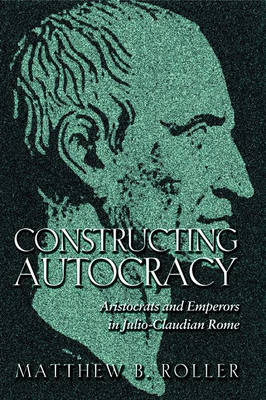
Constructing Autocracy
Princeton University Press (Verlag)
978-0-691-05021-8 (ISBN)
- Titel ist leider vergriffen;
keine Neuauflage - Artikel merken
Rome's transition from a republican system of government to an imperial regime comprised more than a century of civil upheaval and rapid institutional change. Yet the establishment of a ruling dynasty, centered around a single leader, came as a cultural and political shock to Rome's aristocracy, who had shared power in the previous political order. How did the imperial regime manage to establish itself and how did the Roman elites from the time of Julius Caesar to Nero make sense of it? In this compelling book, Matthew Roller reveals a 'dialogical' process at work, in which writers and philosophers vigorously negotiated and contested the nature and scope of the emperor's authority, despite the consensus that he was the ultimate authority figure in Roman society.Roller seeks evidence for this 'thinking out' of the new order in a wide range of republican and imperial authors, with an emphasis on Lucan and Seneca the Younger.
He shows how elites assessed the impact of the imperial system on traditional aristocratic ethics and examines how several longstanding authority relationships in Roman society - those of master to slave, father to son, and gift-creditor to gift-debtor - became competing models for how the emperor did or should relate to his aristocratic subjects. By revealing this ideological activity to be not merely reactive but also constitutive of the new order, Roller contributes to ongoing debates about the character of the Roman imperial system and about the 'politics' of literature.
Matthew B. Roller is Associate Professor of Classics at The Johns Hopkins University. His work which focuses on Rome, reflects wide-ranging interests in literature, history, culture, and ethics.
ACKNOWLEDGMENTS ix ABBREVIATIONS xi INTRODUCTION 3 PART ONE: ETHICS AND IMPERIAL IDEOLOGY 15 CHAPTER ONE The Ethics of Civil War: Competing Communities in Lucan 17 1. Overview 17 2. Traditional Roman Ethical Discourse 20 3. The "Assimilating" Viewpoint 29 4. The "Alienating" Viewpoint 36 5. Ethics and Armies in Conflict 43 6. The Narrator 47 7. Lucan and Early Imperial Aristocratic Ideology 54 CHAPTER TWO Ethics for the Principate: Seneca, Stoicism, and Traditional Roman Morality 64 I. Overview 64 2. Stoicism's Two Regimes of Value 66 3. Where Does Moral Value Reside? Stoic and Traditional Ethics 70 4. Who Judges and How? Dilemmas of Internal and External Evaluation 77 5. The Problem of Exempla 88 6. Ethics in Julio-Claudian Society: Military Glory and Senecan virtus 97 7. Ethics in Julio-Claudian Society: Flattery and Stoicism 108 8. Conclusion 124 PART TWO: FIGURING THE EMPEROR 127 CHAPTER THREE The Emperor's Authority: Dining, Exchange, and Social Hierarchy 129 I. Overview 129 2. Giving a Dinner: The Convivium as Object of Exchange 135 3. Speech and Power: Amicable and Hostile Reciprocity in the Convivium 146 4. Dining with Rulers: The Construction o f Imperial Authority 154 5. Imperial Authority and Gift Giving 173 6. The Emperor as Gift-Debtor 193 7. Conclusion 210 CHAPTER FOUR Modeling the Emperor: The Master-Slave Relationship and Its Alternatives 213 1. Overview 213 2. Freedom and Slavery: A Social Metaphor in Political Discourse 214 3. Father or Master? Two Models for the Emperor in Julio-Claudian Literature 233 4. Competing Paradigms for the Early Principate 247 5. Social Inversion and Status Anxiety 264 6. Status Anxiety and Stoic Remedies 272 7. Conclusion 286 BIBLIOGRAPHY 289 INDEX 301
| Erscheint lt. Verlag | 11.2.2001 |
|---|---|
| Verlagsort | New Jersey |
| Sprache | englisch |
| Maße | 152 x 235 mm |
| Gewicht | 652 g |
| Themenwelt | Geschichte ► Allgemeine Geschichte ► Vor- und Frühgeschichte |
| Geisteswissenschaften ► Geschichte ► Regional- / Ländergeschichte | |
| Sozialwissenschaften ► Politik / Verwaltung ► Staat / Verwaltung | |
| ISBN-10 | 0-691-05021-X / 069105021X |
| ISBN-13 | 978-0-691-05021-8 / 9780691050218 |
| Zustand | Neuware |
| Haben Sie eine Frage zum Produkt? |
aus dem Bereich


